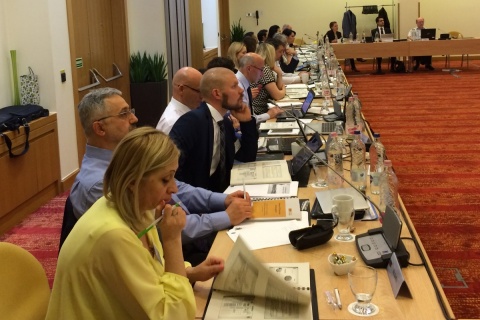The 9th meeting of IOTA Area Group on Debt Management took place in Budapest, Hungary on 6-8 April 2016 with participation of 28 Area Group members from 25 countries and the Taxation and Customs Union Directorate General of the European Commission debating and exchanging experiences on ‘Structure, competence and position of effective debt management function within tax administration’.
 During 'News Headlines' session the delegates updated each other on the recent debt management developments in participating tax administrations. This was followed by presentations from Sweden, the Netherlands, Poland and Slovakia explaining pros and cons of different institutional arrangements (e.g. single body with hybrid structural model, several bodies with clear division of responsibilities) implemented for managing tax debts. These stimulated further discussions in the groups exploring country approaches to institutional arrangements (structure) regarding debt management functions, such as: 1) Managing voluntary payment of debt; 2) Enforced debt recovery; 3) Treatment of insolvency and 4) Additional functions. Participants considered the advantages and made valuable insights as to what extent it may be necessary to adapt the current organisation of debt management in order to be more efficient, flexible and responsive to challenges posed by an increasing number of tax debtors.
During 'News Headlines' session the delegates updated each other on the recent debt management developments in participating tax administrations. This was followed by presentations from Sweden, the Netherlands, Poland and Slovakia explaining pros and cons of different institutional arrangements (e.g. single body with hybrid structural model, several bodies with clear division of responsibilities) implemented for managing tax debts. These stimulated further discussions in the groups exploring country approaches to institutional arrangements (structure) regarding debt management functions, such as: 1) Managing voluntary payment of debt; 2) Enforced debt recovery; 3) Treatment of insolvency and 4) Additional functions. Participants considered the advantages and made valuable insights as to what extent it may be necessary to adapt the current organisation of debt management in order to be more efficient, flexible and responsive to challenges posed by an increasing number of tax debtors.
The next day of the meeting started with the lively session focusing on examples of collaborative measures, e.g. automatic transfer of data between Enforcement Agency and Tax Administration in Finland, framework agreement facilitating smooth and constructive interaction between the Regions and the Collector General`s Division in Ireland, shared databases by audit and tax recovery services in Indirect Tax Administration of Luxembourg, collaboration between audit and debt collection departments within the Norwegian Tax Administration as a part of national coordinated efforts to prevent and uncover labour market crime and tax evasion, etc. that have been developed and adopted in participating tax administrations to improve debt collection and recovery. A second group discussion addressed effective ways as well as existing obstacles in collaboration between auditing/investigation and debt management functions.
The main topic of the afternoon session was debt management competencies building and professional development. Presentation by Belgium offered a valuable overview of development, training and coaching programmes developed within the Federal Public Service Finance for different levels of staff operating in the field of debt collection and recovery. During the third group work session, participants were actively engaged by jointly discussing and practically exploring competence requirements for tax debt management function.
IOTA Secretariat informed participants that the work of the IOTA Project on Measuring Debt Management Performance, especially in relation to a planned survey aiming to collect data from IOTA member countries and to get a better understanding of organisation of debt management function, resource allocation, specific strategy related to the debt management, indicators for measuring the debt management performance, and IT tools supporting the debt management performance measurement. Participants gave feedback on the finalised Questionnaire which will be main tool for conducting the survey and will be made available on the Project’s dedicated website.
As the current two year mandate of the Area Group will end in 2016, the members were committed to continuing the work with particular focus on automation, robotisation and use of business intelligence in debt management processes, measuring debt management outcomes, making effective use of data obtained from the automatic exchange of information to prevent increase in tax arrears. They were confident that the IOTA Area Group’s exchange of practices and dialogue can facilitate more closely aligned, competitive, and efficient management of tax debts.
As far as the next Area Group meeting, scheduled for 5-7 October 2016, is concerned, majority of delegates expressed a desire to discuss issues surrounding use of behaviour economics in managing tax debts, including the concrete examples how behavioural economics help to reduce tax debts and how is it measured (e.g. outbound phone calls and different types of letters to debtors).
Further information about the meeting, including presentations is available here
